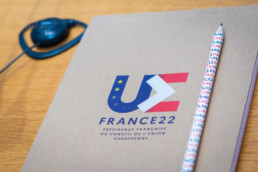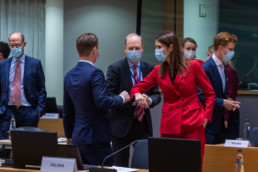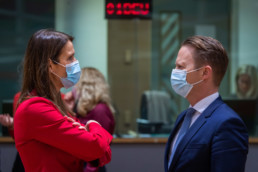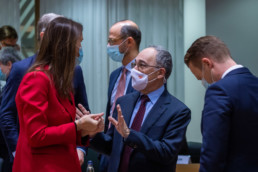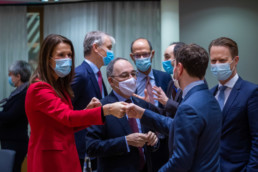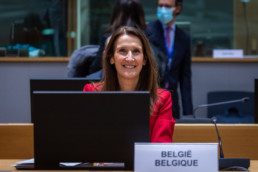On Tuesday 25 January, the Deputy Prime Minister and Minister of European Affairs, Sophie Wilmès, and her counterparts came together for a meeting of the General Affairs Council (GAC) in Brussels.
COVID-19
With the number of infections in the EU rapidly increasing under the influence of the Omicron variant, the Ministers for European Affairs discussed the epidemiological situation, the progress made with regard to vaccination and the policy relating to travel within the Union. On this last point, all the Member States agreed upon an “individual” approach, i.e. one which focuses upon a person’s health and immunisation status rather than upon the region from which he or she comes. From that point on, the colour-coded map will serve as a guide.
Sophie Wilmès: “Belgium is satisfied with this new approach, which is the right one to follow. It is now essential for each Member State to fully implement this decision in order to guarantee as much as possible the freedom of movement for our citizens in Europe. This freedom has already been severely curtailed by COVID-19.”
Belgium also wants to reach an early agreement upon the European recommendation concerning travel from third countries.
With regard to the donations of vaccines, the Deputy Prime Minister pointed out that, thanks to the COVAX system, more than one billion doses of vaccine have already been delivered worldwide. “Belgium has already supplied 8.5 million vaccines through COVAX. The EU is the largest donor with over 265 million doses. This is an effort of which we can be collectively proud. It is essential that we continue in this direction, and also that we provide communication in this regard. We are carrying the work out and people need to know that.”
Relations between the EU and the UK
Commissioner Šefčovič had the opportunity to provide an update on the difficult discussions which are ongoing with the UK. This was followed by an exchange of views among the Council members. One of the stumbling blocks remains the application of the Northern Ireland protocol. Belgium expressed its support for the efforts as well as the approach of Commissioner Šefčovič to ensure that the British implement the protocol specifically and completely. Sophie Wilmès: “It does not seem appropriate yet for us to dwell upon countermeasures. But we must remain vigilant and be ready to react forcefully if the British government takes the unilateral decision to no longer respect the protocol.”
Conference regarding the Future of Europe.
The ministers also took stock of the work of the Conference regarding the Future of Europe, which has entered its final phase. The French Presidency intends to present its conclusions and recommendations on 9 May, Europe Day. Sophie Wilmès: “Belgium is one of the few countries which sent a citizen to Strasbourg last weekend to present the recommendations of our citizens’ panels, organised by the Ministry of Foreign Affairs; panels which were viewed very positively. The recommendations resulting from this work clearly show that the European Union does not communicate enough and is not accessible enough to citizens. We have accordingly a task to accomplish, namely to ensure that Europe’s actions are seen and understood by its citizens. In addition, policy discussions and directions need to concentrate more upon specifics, so that people can see that their everyday concerns are considered.”
Legislative package entitled Strengthening Democracy and the Integrity of Elections
Also in the presence of Commissioner Šefčovič, the ministers discussed the legislative package “Strengthening Democracy and the Integrity of Elections”, within the framework of the European Commission’s European Democracy Action Plan (EDAP). This plan aims to empower citizens and make European democracies more resilient. The package includes several legislative proposals, including a regulation concerning political advertising and a regulation with regard to the funding of political parties and foundations in Europe. The latter provides for the possibility for parties to receive donations from parties located outside the EU in a very controlled manner, under certain conditions and only from countries present within the Council of Europe.
Sophie Wilmès: “Transparency in terms of resources and donations with respect to political parties and foundations is essential in order to ensure the integrity of elections. Belgium is not in favour of allowing donations from countries outside the European Union. Even if they are members of the Council of Europe, it is always more difficult to monitor the respect of the EU’s fundamental values for those countries which are not members.”
It is also stipulated that parties must include internal rules concerning gender balance in their statutes in order to be eligible for European funds, which our country welcomes.
Priorities of the French Presidency
Finally, Belgium, on behalf of the Benelux countries, welcomed the priorities presented by the Secretary of State, Clément Beaune, on the occasion of the French Presidency of the EU Council. In these first six months of the year, the French are focusing upon the fight against COVID-19; the consolidation of European democracy; the strengthening of the rule of law and the protection of fundamental rights; the relationship between the EU and the United Kingdom; the review of the enlargement, stabilisation and association process; and the strengthening of the Union’s crisis response and resilience.
